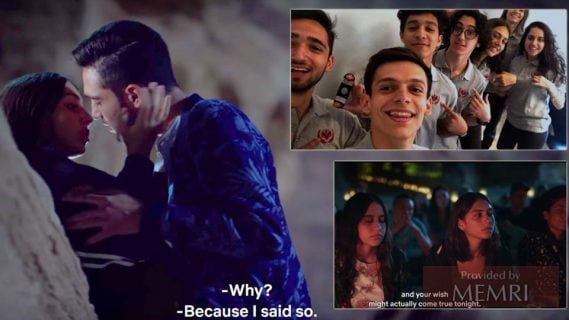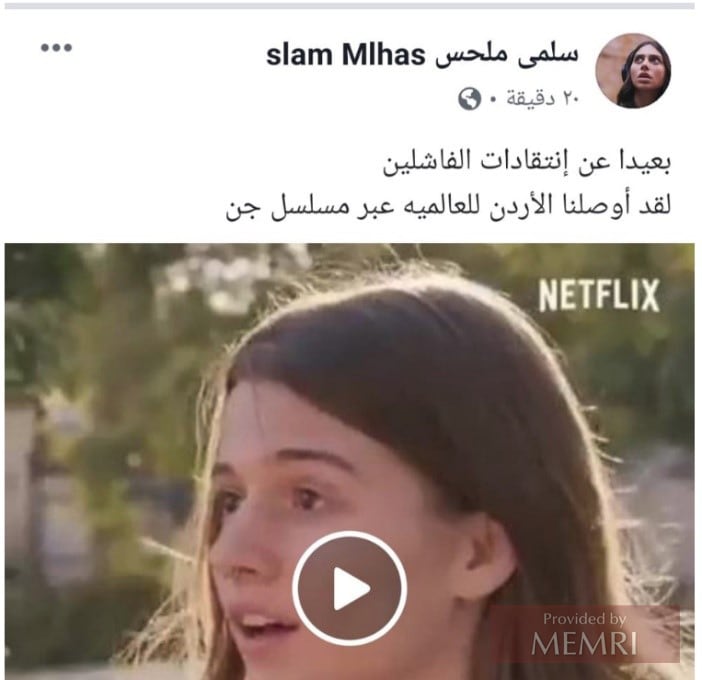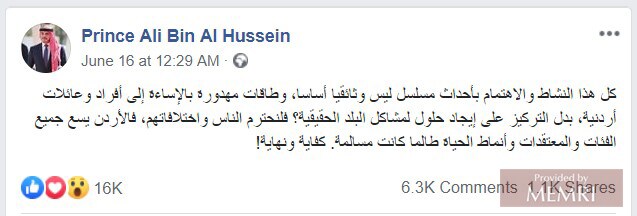In the recent days, Jordan has been astir over Jinn, the first original Arabic series produced by Netflix. Filmed in various locations in Jordan, including the ancient city of Petra, and featuring Jordanian actors, the series tells the story of a group of teenagers whose relationships are put to the test when they invoke the supernatural powers of jinns. The series drew fire from conservative circles in Jordan due to strong language and scenes of kissing, weed smoking and alcohol drinking, which were described as "lewd and offensive" and incompatible with Jordanian culture. Members of Jordan's religious establishment, including the Grand Mufti, as well as MPs and members of the Muslim Brotherhood (MB), harshly condemned the series and those involved in its production, claiming that it offends public sensibilities due to permissive scenes and vulgar language that are unsuitable for Jordanian society and incompatible with its customs, traditions and religious principles. Protest against the series was especially prominent on social media, where users, writing under a "prosecute Jinn" hashtag, called to take legal action against the series producers and actors, as well as the officials who issued it permission to film and air in Jordan.[1]
Following the uproar, the Amman prosecutor general instructed the Cyber Crime Unit in Jordan’s Public Security Directorate to have the series pulled from Netflix in Jordan. [2] Furthermore, the prosecutor general's office launched an investigation into the conduct of the series producers and actors, and into the procedure by which it was licensed to film in the kingdom. Various bodies that were involved in licensing it – including the Royal Film Commission (RFC), the Jordan Media Commission and the Jordan Tourism Board – issued statements denying any responsibility for the content of the series, stating that they had been unaware of it and/or lacked authority to interfere in it.[3]Accusations were directed especially at the RFC, which is in charge of encouraging original Jordanian and foreign productions in the kingdom and which accompanied the production of the series.[4] Princess Rym Al-'Ali, who is the RFC's acting director and a member of its Board of Commissioners, even attended the series premier and congratulated its creators on behalf of the council, saying that she was proud it was made by Jordanian actors and co-directed by a Jordanian filmmaker.[5] In the statement it issued in response to the furor over the series, the RFC rebuffed the criticism against it, stating that, although its role is to encourage original productions, it has no legal authority to supervise their content and does not review their scripts. It stressed that the series is aired on Netflix, which is a paid service, and people are free to choose whether to watch it or not, and added in a critical tone: "A notable fact is that [Jordanians] demand more and more freedoms and personal choice, yet when we encounter cases like this one, some people forget about these demands... There were those who harshly attacked [the series] for its boldness and for crossing various lines, while others thought it reflected the reality of a certain age group in certain circles in Amman. This diversity reflects the pluralism of Jordanian society, with its different sectors, and this is a positive [kind of] pluralism."[6]

Ad for the series Jinn (source: Al-Ghad, Jordan, June 14, 2019)
Alongside the criticism, there were also voices in Jordan, especially on social media, who spoke in favor of airing the series. Jordanian journalists posting on Facebook condemned the authorities for banning the series and warned against suppressing free speech and oppressing Jordan's youth. Former foreign minister Marwan Al-Mu'asher, a leader of the liberal current in Jordan, also denounced the censorship, and called, in an article in the daily Al-Ghad, for a national dialogue to guarantee true pluralism in Jordan.
It should be noted that this is not the first art or entertainment project to cause an uproar in Jordan. On two occasions, in 2016 and again in 2017, the Jordanian authorities canceled a concert by the popular Lebanese rock band Mashrou' Leila, following claims that it "offended public sensibilities" because the band's lead singer is openly gay.[7]
This report presents reactions in Jordan to the series Jinn.
Critics Of The Series: It Is Alien To The Values Of Jordanian Society; Those Responsible For It Should Be Punished
Jordan's Religious Establishment: The Series Is Depraved And Against Islam
As stated, members of the religious establishment spoke out against the series. Jordan's Grand Mufti Muhammad Al-Khalaileh said that it reflects "ethical and moral decline, does not reflect Jordanian customs and morality and deviates from the laws of Islam."[8] The Jordan Islamic Scholars League issued a religious opinion on the series, saying that it features "depraved, crude and permissive content that is forbidden by Islam and contravenes [Jordan's] social norms." The union stated further: "The authentic Jordanian society, known for its honorable and noble [character], would never allow behavior of the kind [shown in the series], for it is alien to it. The clear-sighted people [in Jordan] understand that their society is in the crosshairs of dubious foreign elements who surface from time to time... The popular condemnation [of the series] proves that religion and morality are well-rooted among all the members of the [Jordanian] people... The mission of art and the media is to serve [the aim of] strengthening [people's sense of] identity, belonging and patriotism. It is inconceivable that art should be a tool for [moral] decline and spreading deviancy."[9]
Condemnations In Parliament, Calls To Prosecute Those Involved In The Affair
Criticism was also heard from many MPs, who likewise claimed that the series contravenes the values of Jordanian society and called to take legal measures against those involved in its production and licensing. According to reports, an emergency parliament session was scheduled to discuss the matter, but was later canceled, apparently following the intervention of high-ranking elements in the kingdom.[10]
MP Ibrahim Al-Badour, chairman of the parliament's Education and Culture Committee, urged the government to take immediate measures to prevent the airing of the series and investigate those who had approved filming it in Jordan.[11] MP Khalil 'Atiya wrote on his Facebook page: "I condemn the filming in Jordan of the series Jinn, which contains unacceptable lewd and sexual scenes. This Netflix series violates our values, customs, traditions and religion, and it is unacceptable. I demand to punish all those responsible and all those involved in permitting this permissive series to be filmed in Jordan." MP Mu'taz Abu Rumman said that he would take legal measures against everyone who was involved in the production of the series, because "there were flagrant violations of various clauses of the penal code, including those [pertaining to] offending public sensibilities, causing unrest and dissent, and harming Jordan's reputation." [12]

Scenes from the series Jinn (source: Raialyoum.com, June 17, 2019)
Jordanian Muslim Brotherhood: This Is A Crime Against Jordanian Values And Morals, Whose Perpetrators Must Be Held To Account
The Islamic Action Front, the party of the MB in Jordan, issued a statement describing the series as "a crime against the morals and values Jordanians are raised with," and adding: "This practice is becoming a recurring habit of certain elements who are not interested in the good of our country and people... We in the Islamic Action Front congratulate the proud Jordanian people who stood up against these phenomena that are alien to our values and customs, and demand that the government hold to account everyone who managed, financed and sponsored [the production of] this depraved series and take the necessary measures to ensure that such [cases] will not recur."[13]
The MB's parliamentary faction, the National Reform Coalition, held Prime Minister 'Omar Al-Razzaz morally and legally responsible for the production of the "reprehensible and lewd series that hurts the reputation of Jordan and its people, with their noble values, and spreads a culture of decline and moral atrophy," and calledfor punishing everyone involved in the affair.[14]
Opponents Of Banning The Series: Pluralism And Diversity Are Crucial
The criticism of the series provoked angry responses from its producers and from liberal journalists and intellectuals in Jordan. They protested the lack of free speech and pluralism in the kingdom, and decried the hypocrisy of those calling to ban the series, noting that these people do not protest against the massive consumption of pornography in Jordan or fatwas permitting various kinds of lewd behavior in the name of Islam.
Series Star: Jordan Ranks Eighth In Porn Website Consumption
Actress Salma Malhas, who plays a leading role in the series, wrote on her Facebook account which has since been deleted: "Regardless of the criticism by useless individuals, Jinn has put Jordan on the map."[15]
SUPPORT OUR WORK


Salma Malhas's post on the Facebook page that has since been shut down (Source: Samajordan.com, June 16, 2019)
On a new Facebook account she opened, she wrote: "Jordan is number eight in the world in visits to porn websites, [yet] they say 'pull Jinn [off the air].'"[16] Another member of the cast, Aysha Shahaltough, spoke about the series with the Emirati Women's magazine Woman Arabia. Responding to the interviewer's comment that the series is "slightly bolder than what the region is used to," she replied: "I sense that most people try to hide these things [the behaviors depicted in the series] and don't want to talk about them. But if you want to portray something real and genuine, reality has to be shown as it is."[17]
Prince 'Ali Bin Hussein: We Must Respect Diversity In Jordan
Prince 'Ali Bin Hussein took to Facebook to defend his wife Princess Rym Al-'Ali, acting director of the Royal Film Commission (RFC) that had been blasted for licensing the filming of the series. He wrote: "Why all this fuss and bother over the content of the series, which is not a documentary, and [why] all this energy wasted on hurting Jordanian individuals and families instead of focusing on finding solutions for the real problems of the country? Let's respect people and their diversity, for Jordan is able to tolerate all groups, opinions and lifestyles as long as they are peaceful. Enough!"[18]

Prince 'Ali Bin Hussein's Facebook post
Jordanian Journalists Accuse Series Critics Of Hypocrisy, Warn Against Violating Freedoms
Many Jordanian journalists condemned the banning of the series, but chose to do so on their personal social media accounts rather than in their personal columns in the Jordanian press. Nidal Mansour, head of the Center for Defending the Freedom of Journalists, posted a scathing message on Facebook, which was later deleted, in which he called to defend the freedom of speech and creativity and allow young people "some scope [to express their] freedom." He wrote: "I support freedom of expression, art and creativity, and oppose censorship, before or after the fact. I oppose patronage over people's right to view [certain contents] and over their personal taste. Morality and social norms are relative and are a matter of controversy. The Arabs, including us [Jordanians], talk about sex and visit porn sites more than anyone else, and sadly we also use profanity on a regular basis. We are no saints... Leave the young people some scope [to express their] freedom, because they are not carbon copies of you... Finally, you ask why our situation is not good and people want to leave [the country] and emigrate. It's because accepting dissenting opinions is a value that does not exist [here], and everyone wants to interpret free expression and individual freedoms according to his own standards."[19]
Liberal Jordanian journalist and author Zuleiha Abu Risha wrote on Facebook: "Who in [our] chaste society – a society that is outraged by a kiss on the street or by a movie – came out against the religious scholars [who issued fatwas allowing] the breastfeeding of adults[20] or sexual jihad[21]... and was enraged by [such] distortions of the faith?"[22]

Zuleiha Abu Risha's post
Also on Facebook, journalist Khaled Al-Qudah conceded that the series offended some sectors of the Jordanian public, but warned that the solution must not be "censoring it in advance," for this will lead to "the curtailing of freedoms."[23]
Former Foreign Minister: We Need Serious National Dialogue That Guarantees True Pluralism
In an article in the daily Al-Ghad, Jordan's former foreign minister Marwan Al-Mu'asher, a leader of the liberalcurrent, attacked conservative circles who, he said, do not really believe in diversity, and called for a serious national dialogue to guarantee pluralism in Jordan. "Respecting pluralism," he wrote, "is a basic foundation for building democratic societies that respect the rights of the majority and the minority... What is the state of pluralism in Jordan today? Those in Jordan who come out against the American populism and Israeli racism... do they really believe in political and gender pluralism in [their own country]? Does the belief in pluralism and democracy compel them, for example, to uphold the principle of equal citizenship for all Jordanian men and women? Does pluralism in Jordan mean that citizens, [both] men and women, have the right to disagree? Or do these [conservatives]... apply the label of 'fool,' or perhaps even 'traitor' or 'heretic,' to anyone who thinks outside the Jordanian box as they define it and according to their standards? These are questions that may and even must be asked...
"The truth is that Jordanian society is blatantly diverse from the ethnic, gender, religious and ideological perspectives, but it is time for all of us, from all streams, to ask ourselves whether we truly respect pluralism and believe in its necessity, especially when some of us hold opinions differing from those of others? Do we –politicians, intellectuals and the shapers of public opinion – have sufficient awareness and a sufficiently civilized [outlook] that allows a high-quality national dialogue, free of accusations of heresy, treason and [other] rote accusations... [and allows] formulating rules of engagement that enable dissent without stooping to depravity and personal [insults]? Or does our political and human culture preclude this?... Only a serious and goal-oriented discourse will lead to a policy that will advance the future of this beloved country."[24]
[1] Assabeel.net, June 15, 2019.
[2] Al-Ghad (Jordan), June 14, 2019.
[3] Alghad.com, June 13, 15, 2019, Facebook.com/filmjo, June 14, 2019.
[4] Film.jo, August 13, 2018.
[5] Assabeel.net, June 13, 2019; Al-Ghad (Jordan), June 14, 2019.
[6] Facebook.com/filmjo, June 14, 2019.
[7] See MEMRI Inquiry & Analysis No. 1342, Public Debate In Jordan On Freedoms And Values Following Ban On Rock Band With Gay Singer, September 5, 2017.
[8] Sawaleif.com, June 14, 2019.
[9] Assabeel.net, June 14, 2019.
[10] Raialyoum.com, June 17, 2019.
[11] Al-Ghad (Jordan), June 14, 2019.
[12] Al-Arabi Al-Jadid (London), June 15, 2019.
[13] Assabeel.net, June 15, 2019.
[14] Albosala.com, June 14, 2019.
[15] Facebook.com/420220045488208, June 15, 2019.
[16] Facebook.com/314597686149248, June 18, 2019.
[17] Emirateswoman.com, June 2019.
[18] Facebook.com/alibinalhussein, June 16, 2019. The prince's post did not go unanswered. Activists on social media cited an announcement issued by the royal court in the past, which stated that princes are free to make statements as part of the freedom of speech granted to all citizens, but they do not represent the establishment or the royal family. Raialyoum.com, June 17, 2019.
[19] The original post has been deleted, but it was quoted by several sources: Facebook.com/AmmanNet, June 13, 2019; noorjonews.com, alkawnnews.com June 14, 2019.
[20] The reference is to fatwas that permitted a woman to breastfeed a grown man unrelated to her, such as a colleague at work, thus giving him the status of a family member and allowing her to be alone in a room with him, which would otherwise be forbidden. See MEMRI Inquiry & Analysis No. 626, Controversy in Saudi Arabia over Fatwa Permitting Breastfeeding of Adults, July 28, 2010; Inquiry & Analysis No. 355, Al-Azhar Lecturer Suspended after Issuing Controversial Fatwa Recommending Breastfeeding of Men by Women in the Workplace, June 3, 2007.
[21] The reference is to fatwas that allegedly allowed women to travel to jihad fronts to provide sexual services to jihad fighters as a way of contributing to the war effort and earning a divine reward. See MEMRI Inquiry & Analysis No. 1062, Tunisian Daily Al-Shurouq's Campaign Against 'Sexual Jihad', February 1, 2014.
[22] Facebook.com/profile.php?id=100007991625136, June 15, 2019.
[23] Facebook.com/khaledqudah2, June 13, 2019.
[24] Al-Ghad (Jordan), June 19, 2019.




